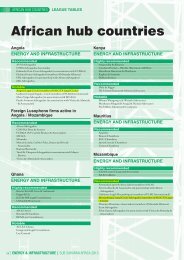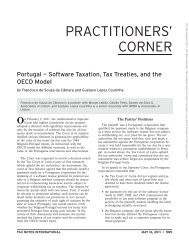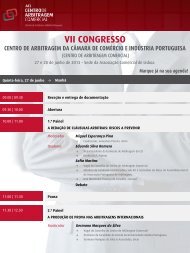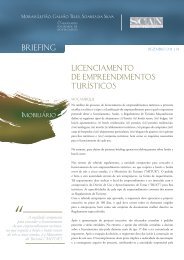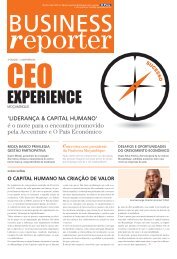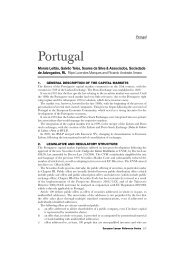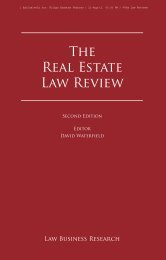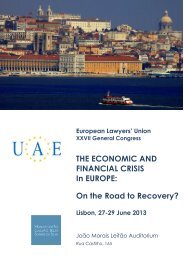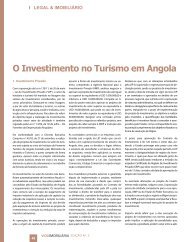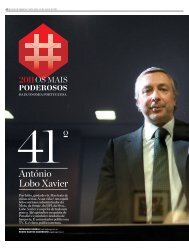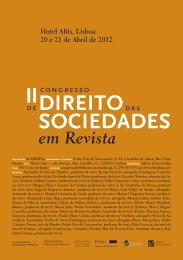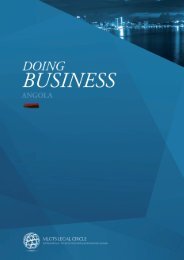Payments for Engineering Services Are Not Subject to Withholding Tax
Payments for Engineering Services Are Not Subject to Withholding Tax
Payments for Engineering Services Are Not Subject to Withholding Tax
Create successful ePaper yourself
Turn your PDF publications into a flip-book with our unique Google optimized e-Paper software.
Portuguese <strong>Tax</strong> Court: <strong>Payments</strong> <strong>for</strong><br />
<strong>Engineering</strong> <strong>Services</strong> <strong>Are</strong> <strong>Not</strong> <strong>Subject</strong> <strong>to</strong><br />
<strong>Withholding</strong> <strong>Tax</strong><br />
The <strong>Tax</strong> Court of Lisbon ruled in February that<br />
payments made <strong>for</strong> engineering services should be<br />
characterized as fees, rather than royalties, <strong>for</strong><br />
Portuguese withholding tax purposes.<br />
Characterizing such payments has been a longstanding<br />
problem <strong>for</strong> many national tax administrations.<br />
Portuguese tax authorities have tended <strong>to</strong><br />
classify payments made <strong>for</strong> engineering services as<br />
royalties. Royalties have been subject <strong>to</strong> withholding<br />
tax since even be<strong>for</strong>e 1998, when the Portuguese<br />
corporate income tax code first began <strong>to</strong> impose<br />
withholding taxes on fees <strong>for</strong> services rendered by<br />
nonresident entities without a permanent establishment<br />
in Portugal.<br />
Since the 1960s, Portugal has based its international<br />
tax policy on the perception that its economy<br />
is a net importer of capital and has tended <strong>to</strong> impose<br />
high withholding taxes on dividends, interest, and<br />
royalties. The ‘‘<strong>for</strong>ce of attraction principle’’ — concerning<br />
the tax imposed on the income earned by,<br />
and property held by, <strong>for</strong>eign head offices of PEs,<br />
and by PEs themselves — was applied later, so the<br />
country has generally tried <strong>to</strong> increase revenues —<br />
or not <strong>to</strong> lose revenues — by characterizing payments<br />
as royalties.<br />
The Issue<br />
Commenta<strong>to</strong>r Michael Krause once discussed differentiating<br />
between fees paid <strong>for</strong> technical services<br />
Reprinted from <strong>Tax</strong> <strong>Not</strong>es Int’l, May 8, 2000 p. 2029<br />
by Francisco de Sousa da Camara<br />
from know-how, and fees paid <strong>for</strong> royalties. 1 Commenta<strong>to</strong>r<br />
Karl Sonntag recently approached the<br />
problem in a new way by defining the term ‘‘engineering’’<br />
and by distinguishing engineering from<br />
related services. 2 ‘‘As there is no generally recognized<br />
definition of the term ‘engineering,’’’ he has<br />
said, ‘‘likewise no commonly accepted description of<br />
its sub-elements exists. The borders between them<br />
are indistinct, and gray areas occur. In a simplified<br />
way it can be stated that:<br />
• basic engineering is the technical documentation<br />
(drawings, verbal descriptions, technical<br />
data, diagrams, etc.) showing the general<br />
layout (design) of the plant in question;<br />
whereas<br />
• detail engineering is the graphic, verbal, and<br />
numerical description of each detail.’’<br />
Sonntag adds that regardless ‘‘of its breakdown<br />
in<strong>to</strong> different elements, as a rule, engineering serves<br />
the purpose of planning, building, and handing over<br />
1 Michael Krause, ‘‘<strong>Tax</strong> Treatment of the Provision of<br />
Technical <strong>Services</strong>, International <strong>Tax</strong>ation of <strong>Services</strong>,’’ proceedings<br />
of a seminar held in Rio de Janeiro in 1989, during<br />
the 43rd Congress of the IFA.<br />
2 Karl Sonntag, ‘‘The <strong>Tax</strong> Treatment of <strong>Engineering</strong> in<br />
International Large-Project Contracting,’’ 25 Intertax 1, 9-12<br />
(1997).<br />
(C) <strong>Tax</strong> Analysts 2000. All rights reserved. <strong>Tax</strong> Analysts does not claim copyright in any public domain or third party content.<br />
<strong>Tax</strong> <strong>Not</strong>es International 1
the plant. Hence, <strong>for</strong> tax purposes there is no need <strong>to</strong><br />
differentiate between its individual elements.’’<br />
Referring <strong>to</strong> paragraph 11 of the commentary <strong>to</strong><br />
article 12 (on royalties) of the OECD model treaty,<br />
Sonntag explained that ‘‘an element of know-how<br />
transfer from contrac<strong>to</strong>r <strong>to</strong> cus<strong>to</strong>mer also takes<br />
place at the same time. This is, however, either a<br />
side effect that cannot be avoided (hence, not part of<br />
the per<strong>for</strong>mance agreed upon in the contract), or<br />
operational know-how (it is self-evident that the<br />
buyer of [an] industrial plant must be instructed<br />
how <strong>to</strong> use it).’’ As a result, Sonntag concludes that<br />
‘‘engineering falls in<strong>to</strong> the category of technical<br />
services [while] profits derived from it are only<br />
taxable in the contrac<strong>to</strong>r’s state of residence.’’<br />
Portugal’s courts have addressed several international<br />
tax disputes involving engineering fees. Most<br />
have revolved around issues of associated enterprises<br />
(article 9 of the OECD model convention and<br />
the Portuguese equivalent provision — article 57 of<br />
the corporate income tax code), rather than issues of<br />
characterization (the applicability of articles 7 (business<br />
profits) and 12 (royalties) of the OECD model<br />
convention).<br />
Lisbon Decision<br />
In the February Lisbon decision, a multinational<br />
company had its head office and its effective management<br />
in Switzerland. The company also had a PE<br />
in Portugal that sold and distributed industrial<br />
products, mainly chemicals. The multinational<br />
group purchased a Portuguese company that dealt<br />
with chemicals, and it signed a concession agreement<br />
<strong>to</strong> explore the purchase of other Portuguese<br />
companies in complementary areas.<br />
In the early 1990s, the Portuguese branch of the<br />
multinational constructed a new fac<strong>to</strong>ry <strong>to</strong> produce<br />
chemicals. Under the terms of the project, the<br />
branch signed several agreements <strong>to</strong> obtain services,<br />
including engineering services, from nonresident<br />
entities that had no PE in Portugal. At the same<br />
time, <strong>to</strong> obtain a license the branch paid fees and<br />
royalties <strong>to</strong> a nonresident entity without a PE in<br />
Portugal. The entities didn’t withhold tax from any<br />
of the payments.<br />
The branch was active <strong>for</strong> three years. At the end<br />
of that period, the tax authorities audited it and<br />
concluded that all payments <strong>to</strong> nonresidents were<br />
royalties. The authorities assessed the branch withholding<br />
tax at 15 percent of the <strong>to</strong>tal amount paid <strong>to</strong><br />
nonresident entities. The assessment was based on<br />
article 6(m) of the individual income tax code (on the<br />
characterization of income) and article 4, numbers 2<br />
and 3(c), of the corporate income tax code.<br />
Reprinted from <strong>Tax</strong> <strong>Not</strong>es Int’l, May 8, 2000 p. 2029<br />
The assessment didn’t distinguish between payments<br />
made <strong>for</strong> the license, engineering services,<br />
remaining services, or expenses. The assessment <strong>for</strong><br />
unpaid withholding tax used the domestic tax rate,<br />
rather than the applicable bilateral treaty rate,<br />
following the established rule that treaties aren’t<br />
recognized if the parties don’t complete the necessary<br />
documentation (which is necessarily the case<br />
with conflicts of qualification).<br />
In court, it was noted that the assessments were<br />
based on a tax report that didn’t refer in detail <strong>to</strong> the<br />
agreements and contracts signed by the branch,<br />
which meant classification of the payments as royalties<br />
was unsubstantiated. The branch relied on the<br />
inconsistencies regarding the agreements and argued<br />
that treaty provisions wouldn’t be applicable.<br />
The court concluded that payments made under<br />
the agreements, invoices, and services couldn’t be<br />
classified as royalties. Witness testimony helped<br />
prove it was proper <strong>to</strong> characterize the vast majority<br />
of payments as fees. The expenses and the payments<br />
<strong>for</strong> the license were considered as a reimbursement<br />
of expenses and as royalties, respectively. The court<br />
found that the engineering payments were fees <strong>for</strong><br />
services rendered by a nonresident company, and it<br />
clarified that the services were auxiliary <strong>to</strong> the<br />
construction (fac<strong>to</strong>ry) contract. The court’s analysis<br />
of each clause of the agreements was pivotal.<br />
Concluding Remarks<br />
A puzzling aspect of the case is the tax authorities’<br />
failure <strong>to</strong> investigate their assumption that the<br />
contrac<strong>to</strong>r (the nonresident company that supervised<br />
much of the fac<strong>to</strong>ry construction and rendered<br />
the engineering services) had a PE in Portugal<br />
during the construction. If the authorities had investigated,<br />
all relevant income in the PE’s hands<br />
would have been subject <strong>to</strong> tax in Portugal.<br />
It is possible that the authorities attempted <strong>to</strong><br />
identify a person responsible <strong>for</strong> the tax payments in<br />
Portuguese terri<strong>to</strong>ry, because the nonresident was<br />
no longer operating in Portugal when the audit was<br />
concluded. However, the court’s decision didn’t address<br />
that possibility.<br />
The case is important because it centers on the<br />
persuasive and thorny issue of royalties-versus-fees<br />
and establishes an interesting precedent <strong>for</strong> future<br />
cases. Above all, it shows that when a conflict arises<br />
over the classification of a payment, the quality of<br />
the agreements, the documentation presented, and<br />
the consistency of arguments will all influence a<br />
court’s decision.<br />
◆<br />
♦ Francisco de Sousa da Camara is with Morais<br />
Leitao & J. Galvao Teles & Associados in Lisbon.<br />
(C) <strong>Tax</strong> Analysts 2000. All rights reserved. <strong>Tax</strong> Analysts does not claim copyright in any public domain or third party content.<br />
2 <strong>Tax</strong> <strong>Not</strong>es International



